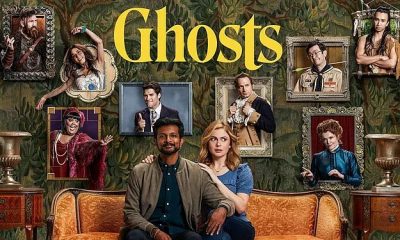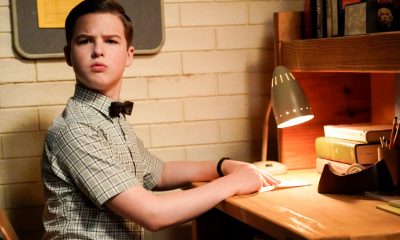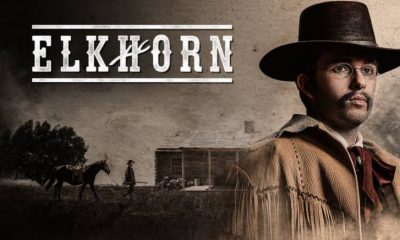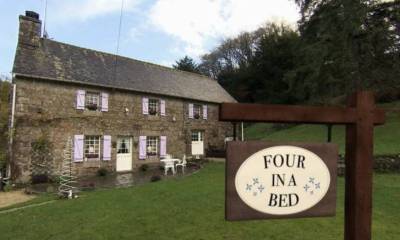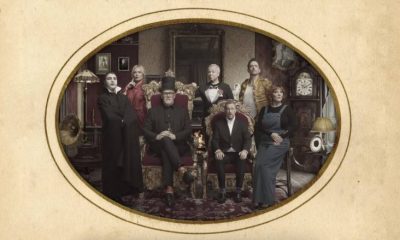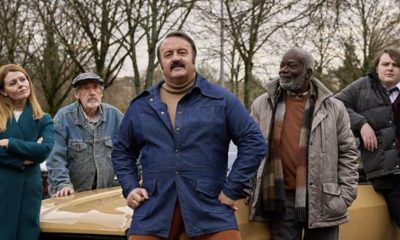Features
British Comedy in the 1970’s
British comedy entered the 1970s with some new sheriffs in town. They weren’t technically new on the scene – they had all been around for almost a decade and separately (or in pairs) worked on much of what mattered comedically during the 60s. Yet when they joined forces there was a creative combustion that resulted in something … well …something completely different.
It may have been something different, but it wasn’t exactly new. Monty Python’s Flying Circus, which actually premiered in late 1969, took its cue from the brilliant Spike Milligan, whose series of programs under the moniker Q revolutionized British comedy with its departure from the typical sketch comedy format. Skits no longer needed to end on a punchline – in fact, they could be abandoned in mid-stream if necessary or simply flow without any rhyme or reason into the next scene.
The Python’s took this concept and used it to produce 45 episodes of inventive, irreverent, flat-out silly television that is still worshipped fourty years later.
The secret was in the way they brought together individual strengths to form a unified whole. They fashioned a perfect blend of verbal gymnastics and stunning visual buffoonery, thanks to Terry Gilliam’s mind-numbingly bizarre animations. Even the costume designers contributed a great deal, changing the men into suburban housewives, Scotsmen, Italian gangsters, and yes, even a tennis playing blancmange.
The four seasons of Python varied widely in quality. Some of the skits are almost painful to watch and once John Cleese got bored and left after the third season the quality deteriorated and the gang schlepped through one final season before they knew it was time to call it quits.
The Pythons could definitely stumble, but when they were good they were really good. The Pythons didn’t end after they filmed the final television series in 1974. In fact, they became something of an industry. They toured, released records, and, thanks to the wonderful foresight of PBS station KERA in Dallas, became known in America.
Cleese, who left after the third season of the television show, returned to the Python fold when they toured and also joined them for the move to the big screen. Monty Python and the Holy Grail (1975) was their first hit and they stirred up lots of controversy when they released Life of Brian in 1979. Brian was the subject of protest even before it was released, thanks mostly to a false belief that it was an attack on religion.
The Pythons have often been referred to as the comedic equivalent of The Beatles, and that’s a fair assessment. The comparison to the Beatles is also appropriate because not much of what they have accomplished individually can match what the brilliance of what they created together.
John Cleese arguably fared the best. He followed up his stint with the most influential sketch comedy show ever by creating the program that is often regarded as the greatest sitcom ever. Fawlty Towers
Fawlty Towers first aired in 1975 and was collaboration between Cleese and his then-wife Connie Booth. As is well known, the inspiration for Fawlty Towers was a real- life hotelier that the Pythons encountered while on tour. Cleese used him to create a character in an episode he wrote of a sitcom called Doctor At Large and then expanded the character into the ill tempered, snobbish monster Basil Fawlty – not exactly the type of meet and greet smiler who should run a hotel, but there you go.
Fawlty Towers is not only Cleese’s tour-de-force, but he is matched by the sheer power of Prunella Scales as Basil’s wife Sybil and Andrew Sachs’s memorable portrait of Manuel. Interestingly enough, when the series was entered for a prize in the prestigious Montreux (Switzerland) Television Film Festival, it didn’t win partially because the Swiss judge found the character of Manuel offensive. “Funny foreigners may be a joke to the English, but not to us,” he proclaimed. “We are your funny foreigners. Manuel is a character in dubious taste.” Oh well, to each his own, but they ended up giving Cleese an award anyway for his special Norway: Home of Giants.
Fawlty Towers only lasted two seasons, probably because Cleese is easily bored and also because both he and Booth were intent on keeping the quality of the absolute highest caliber. The process had to be draining on them – they would spend weeks writing each episode due to the extraordinary care they took with the plotting and the language.
In fact, there was such concern about maintaining the high quality that Fawlty Towers almost ended after the first season. There was a four- year gap before Cleese and Booth were convinced that they could attempt a second season, but the wait was worth it. The series ended on the highest of notes and Cleese was never persuaded to do another. He would not risk seeing it become inferior or overstaying its welcome.
Meanwhile, Eric Idle created his own classic when he took the story of The Beatles and came up with a “mockumentary” called All You Need is Cash.
The idea for this grew out of Idle’s first post-Python project, a show called Rutland Weekend Television. The program revolved around a very small television station and one of the guests on the Christmas special was George Harrison.
Idle’s friendship with the ex-Beatle (whose money got Life of Brian made when the original distributor backed out) inspired him to create a spoof film that was shown when he hosted Saturday Night Live. It was a short history of that famous rock group The Rutles, the “pre- fab four” whose legend would “last a lunchtime.”
SNL producer Lorne Michael was impressed and asked Idle to make a full-length special detailing the career of Dirk, Barry, Stig and Nasty, a.k.a. The Rutles. All You Need is Cash was shown on NBC in March of 1978, but it was one of the lowest rated programs that week.
Despite poor viewer support at the time, All You Need is Cash remains a classic of the genre. The truth is it’s probably just too clever for its own good. Idle and co-director Gary Weis provided beautifully detailed parodies of Beatles films such as A Hard Day’s Night and they were helped immeasurably by Neil Innes, whose faux Beatle tunes provided an inspired soundtrack.
Whereas Idle was used to working on his own, Terry Jones and Michael Palin had normally written together when they were with the Pythons. After the troupe’s demise, Jones and Palin continued the partnership and spent the rest of the 70s collaborating on a series of nine half-hour vignettes that went out under the title of Ripping Yarns.
These were based on the type of adventure tales popular in Britain during the early 1900s. The same strength that Jones and Palin brought to the Pythons – comedy that was more visual and atmospheric – was brought to this series. To keep their vision intact, they insisted that these be filmed instead of taped, and the added expense meant that only nine of them were made.
Palin also took the time to star in Jabberwocky, directed by Terry Gilliam and released in 1977. The film was visually stunning and imaginative, as could be expected from Gilliam, but it was perhaps too gory and dark for mainstream audiences and did disappointing business at the box office.
There were also smaller projects that kept the Pythons occupied and the 70s were a creatively fertile time for all of them.
The Goodies
The Goodies Rule, Ok?
Yet the Pythons were not the only ones who excelled at being silly. Cleese and Chapman’s mates from the Cambridge Footlights Club – Tim-Brooke Taylor and Bill Oddie – joined forces with Graeme Garden to create The Goodies.
The Goodies was sold to the BBC when the trio went to Michael Mills, then head of BBC television comedy, and9 told him that they wanted to a show about an “agency of three blokes, who do anything, any time.”
Of course, since the title is The Goodies, the things they do are for good. The three men kept their own name and facets of their personality for their television characters. Graeme is something of a nutty scientist, Tim is highly patriotic but a bit cowardly and Bill is a nature loving, bird watching hippy who writes goofy tunes.
The Goodies was the equivalent of a cartoon with real-life actors – very silly slapstick with a break for spoof advertisements. Sometimes they would be off to save the world from the likes of villains like that ferocious feline Kitten Kong, other times they sailed off to an undiscovered island, and they even took a break to do a marvelous spoof of John Travolta musicals.
The Goodies was a staple on British television from 1970 until 1982 and the series spawned several successful spin-offs such as books and even hit singles, one of which encouraged listeners to do a new dance called The Funky Gibbon. The cast of the much loved Dad’s Army. A big screen version starring Toby Jones and Bill Nighy has been made.
Sitcoms Rule, Too
While the Pythons and the Goodies were breaking new ground in sketch comedy, producer/writer David Croft was successfully and brilliantly carrying the flag for more traditional fare.
Croft still had a major hit in Dad’s Army when one day he received a script from a young writer named Jeremy Lloyd. The story was taken from Lloyd’s experiences at a department store called Simpson’s and the title was a simple phrase that Simpson’s employees probably used time and time again: Are You Being Served?
AYBS? embodied the typical order that existed in British society. Everyone at Grace Brother’s Department Store had their position in the store’s pecking order and was not expected to stray from it.
The humor that flowed from AYBS? can perhaps be summed up best in a quote from Monty Python: “Grin, grin, wink, wink, nudge nudge…say no more.” Croft himself termed it “’seaside postcard” humor, meaning that it was laden with innuendo and big chested babes. Not to mention one very camp sales assistant.
The people loved it. John Inman as the fey Mr. Humphries and Mollie Sugden as the brassy Mrs. Slocombe were the breakout performers, but this was very much an ensemble piece that stayed strong even through a number of cast and character changes.
Following the tumult and change of the 1960s, maybe the popularity of AYBS? can be explained by its inherent sense of nostalgia. It harkened back to a more ordered, civilized time when dressing well, good manners and knowing one’s place were still of the utmost importance. It also took viewers back to a more simple time. Sure, the Benny Hill style humor was sometimes in questionable taste, but it was done with an air of innocence – the most famous example being that of Mrs. Slocombe’s ongoing references to her pussy.
Yet above all, AYBS? was filled with colorful, distinct characters and enough catchphrases to float the proverbial battleship. No matter how many times Mr. Humphries said his signature “I’m free!” or Mrs. Slocombe claimed to be “unanimous in that” viewers couldn’t help but laugh.
The show had its many detractors who thought of it as cheap, easy and tasteless, but they were definitely out voted by millions of viewers. As was the norm with popular 70s sitcoms, the show was milked for everything it was worth. A film was produced in 1977 in which the employees of Grace Brothers went on holiday to Spain. There was also a stage play, an Australian version of the show, plus an attempt to make an American adaptation that didn’t make it much past the pilot stage.
As if he didn’t have enough to do, Croft also reunited with Dad’s Army co-writer Jimmy Perry to create the story of a theatrical troupe based in India during wartime called It Ain’t Half Hot Mum.
This show contained many of the same types seen in AYBS? and Dad’s Army. Some of the men were camp and effete while others were the blithering, ineffective authority types whose behind was usually saved by the sensible underling. IAHHM gave the Croft/Perry partnership another sizeable hit that ran from 1974-1981.
An unusual Croft misstep occurred in 1978 when not even Mrs. Slocombe herself, Mollie Sugden, could make a hit out of Come Back Mrs. Noah. The concept was promising, with Sugden playing a housewife in the year 2050 who wins a chance to tour a new space exploration craft called the Britannia Seven. The vehicle is not yet in space, of course, but during her visit it accidentally blasts off and the rest of the series revolves around the attempts to get her back.
Croft wrote the series with his Are You Being Served? collaborator Jeremy Lloyd and, along with Sugden, it featured other member of Croft’s repertory company, including Ian Lavender (Dad’s Army), Gordon Kaye (who later starred in ‘Allo ‘Allo) and more. It only lasted one season, proving that perhaps Croft’s strength laid in looking at Britain’s past, not at its future. Fall and Rise of Reginald Perrin
Several other long-running Britcoms were products of the ‘70s. The marvelous Leonard Rossiter created one of British comedy’s most memorable characters when he played the title role in The Fall and Rise of Reginald Perrin.
Reggie Perrin suffers a mid-life crisis of the worst kind when the numbing sameness of his life leads him to fake his own death. Is this his chance at a new start? Well, not really.
Reginald Perrin was one of the earliest and best examples of an adult sitcom that could provoke an equal number of laughs and thoughts. Rossiter created a memorable portrait of a man on the verge of a nervous breakdown and was ably supported by Pauline Yates as his wife. Geoffrey Palmer had one of his first substantial roles as Reggie’s brother-in-law, Jimmy Anderson, a former military man who just can’t seem to leave the service life behind.
At roughly the same time, Rossiter also starred in another popular series called Rising Damp. He played Rigsby, the grumpy, meddling landlord of a seedy boarding house. His tenants include a medical student (played by Richard Beckinsale, father of Pearl Harbor star Kate Beckinsale) and a young man who is a tribal prince in his African homeland. Rigsby pays the most attention, however, to his female tenant, a love starved spinster named Miss Jones, played by Frances de la Tour.
The fact that he could take on two such dissimilar characters at the same time paid testament to what a great talent Rossiter was and how much was lost when he passed away in 1984 at the age of 57. Rossiter was a driven perfectionist who demanded much of himself and of his co-workers, so when he missed a cue while in a stage production of Joe Orton’s Loot, the cast and crew knew something was wrong. They found him in his dressing room, slumped over in a chair, the victim of a heart attack. British comedy lost a legend at much too young of an age.
Tragically, the same fate befell Rossiter’s Rising Damp co- star Beckinsale, who suffered a fatal heart attack in 1979 at the age of 31. Becksinsale was also doing double duty, starring in Rising Damp and also another 70s sitcom called Porridge.
PorridgeIt is little known in the States, but Porridge is generally considered one of the all time great Britcoms. It stars Ronnie Barker as habitual thief Norman Stanley Fletcher, who is sentenced to jail for five years. (In fact, the title is a slang expression for prison.) While there he tries to teach his cellmate, a first-offender named Godber (played by Beckinsale) the ropes.
The character of Fletcher was miles away from another that Barker would create during the 70s. In Open All Hours he played a shop owner called Arkwright. He is helped along at the shop by his nephew Granville (David Jason), who is desperate to experience life beyond the small town they inhabit.
Open All Hours was the creation of Roy Clarke, who may be the single most prolific writer in Britcom history. During the three-year gap between the pilot and the first season of Open All Hours he created and wrote the first three series of Last of the Summer Wine, which is now the longest-running situation comedy in television history, now entering its 24th season. Last of the Summer Wine
Last of the Summer Wine is not only memorable because of its characters – the trio of elderly miscreants reliving their youth and the women they love – but it has always been served well by its location. The town of Holmfirth has always been as much a star of the show as Brian Wilde, Peter Sallis and the late Bill Owen. This setting, along with the music and scripts, combine to create a strong sense of time and place that is rare in any television program, let alone a sitcom. Like AYBS? viewers have been willing to follow this show through numerous cast and character changes.
Those are only a couple of the programs that can be attributed to Clarke, a former teacher who has carved a niche for himself with his uncanny ability to create characters and dialogue that perfectly reflect the north of England.
While Clarke depicted life in the north of England, Bob Larbey and John Esmonde tackled life in suburban London with The Good Life. Like Reggie Perrin, Tom Good is going through a mid-life crisis. Rather than fake his own death, however, he quits his job on his 40th birthday and decides to become self-sufficient.
He persuades his wife Barbara to support him with this idea, but little do they know what they’ve gotten themselves into. Everything will be home grown and made and their suburban backyard turns into a home for goats, pigs, and other things that really don’t belong in suburban backyards. Luckily, their neighbors, the socially upscale Leadbetters, eventually learn to live with goats, pigs, and mud.
The success of the series impacted the career of its female leads the most. Felicity Kendal, as Barbara Good, became the object of every man’s affection and, following her star-making turn as the uppity neighbor Margo, Penelope Keith was rewarded with her own sitcom, To The Manor Born.
To the Manor Born deals with a subject seen time and time again in British comedy: the class system. Keith gets to play another snooty blue blood in this series, but one who has fallen on hard times. Following the death of her husband, Audrey fforbes-Hamilton finds that she has unknowingly inherited something she didn’t expect: a large amount of debt. She is then forced to sell her beloved family home, Grantleigh Manor, to the nouveau- riche Richard DeVere. This development plays havoc with Audrey’s pride as she tries to save face with her social crowd.
DeVere is played by the suave Peter Bowles, who was actually the first choice to play Keith’s husband in The Good Life, but declined the offer due to a theatrical commitment.
Over the course of twenty-one episodes the couple played cat-and-mouse and in the end said, “I do,” meaning that Audrey could once again live in her home. This final episode still remains one of the most-watched programs ever in UK television history, with an audience of approximately 24,000,000.
Other sitcoms of the 70s included On The Buses, which was vulgar, cheap and critically panned, but the viewers loved it and kept it going for six seasons. It was simply the story of a working-class bloke (played by Reg Varney) who, while not being driven crazy by his overly protective mother, his sister, and his lazy brother-in-law, was driving a bus and scaring up some trouble with his mate Jack.
Writer Carla Lane, who already had a hit with The Liver Birds, the saga of two Liverpool lasses, scored a hit with Butterflies. This somewhat downbeat Britcom is the story of Ria Parkinson (played by Wendy Craig), a woman going through a mid-life crisis, who feels like she’d better start grabbing life by its tail and fill the emptiness she feels before its too late. How to explain this – and her growing attraction to an unhappily married man – to her family is something she finds difficult to do. Geoffrey Palmer played her boring but responsible husband, Ben, and Nicholas Lyndhurst had an early role as the Parkinson’s son, Adam. The show’s central theme – the temptation of adultery – is one that Lane would revisit later when she wrote The Mistress, starring Felicity Kendal.
Double The Fun
The 70s were also a great time for British double acts. Ronnie Barker (when not playing Fletcher and Arkwright) teamed up with his physical opposite – the tiny, bespectacled Ronnie Corbett – as The Two Ronnies.
The Two Ronnies was more of your basic variety show with Barker and Corbett playing a number of different characters as well as engaging in musical numbers and spoof newscasts. During each show Corbett also had a solo spot, sitting in a large chair and doing a rambling monologue about anything and everything.
The show had a number of writers, including David Renwick, who would later write One Foot in the Grave and David Nobbs, who wrote Reginald Perrin. There were also contributions from all of the Pythons except for Gilliam. Yet the success of the show boiled down to the chemistry between the two men and the show remained popular for 15 years. The duo rang down the curtain on their partnership with a special in 1985 and Barker retired for good three years later. Corbett, however, resurrected his “in the chair” monologues during the late 90s for Ben Elton’s series The Man from Auntie.
Though less known in America, the importance of another double act – Morecambe and Wise – cannot be underestimated.
Eric Morecambe and Ernie Wise had been around since the late 50s, but their self-titled BBC series really took off during the late 60s/early 70s and sealed their reputation as a British comedy classic. Like The Two Ronnies, these men had a chemistry and a genuine affection for each other that could not be denied. Unlike Corbett and Barker, however, Morecambe and Wise relied only upon very few writers who kept the show going with its trademark Benny Hill-style leering humor and energetic musical numbers.
The duo spent many years taking their show between the BBC and its competitor and sadly, their final series (in 1983) did not allow the duo to go out on a high note. Eric Morecambe, who had suffered from heart problems for years, passed away in 1984, but their show is still remembered as one of the high water marks in British television comedy.
The Great Scot Arrives
The 70s also heralded the arrival of one of the greatest of all comedic storytellers, Billy Connolly. Connolly was born in Glasgow, Scotland in 1942. He worked on the docks, had a stint in the military, and started his showbiz career on the coffee house circuit, playing the banjo and singing politically conscious folk songs. His act eventually developed to where it was much more about comedy than about music.
Connolly’s unfailing Scots charm, nimble tongue and even more nimble mind made him quite a natural for the chat show circuit. Appearances on Parkinson and other shows, as well as the release of his first album, made him a star outside of his native Scotland.
His concert appearances soon began selling out and established him as a performer of the highest order. Not many people are capable of keeping an audience spellbound for two hours or more, but Connolly can. His material is sometimes political, sometimes autobiographical, but always honest and always hysterical.
Connolly later made a move to America when he replaced Howard Hesseman on Head of the Class, which led to another sitcom called Billy. Neither of these was an enormous success, probably because his personality is just too big to be contained to the small screen and the constraints of a thirty-minute sitcom.
Connolly has also done straight acting and received very good notices co-starring opposite Dame Judi Dench in the 1996 historical drama Mrs. Brown. It is typical of his natural irreverence that when he first found out Dench had expressed an interest in the role of Queen Victoria, Connolly shot back that his first choice was pudgy Roger Rabbit star Bob Hoskins.
Not The Nine O’clock News
The Pythons blasted in the seventies with their groundbreaking lunacy, but overall, this decade is often thought of as the age of the twee sitcom as epitomized by The Good Life. The last year of the decade, however, was a transitional one – a year when comfortable, safe suburbia was replaced by the cheek and impertinence of Not The Nine O’Clock News.
NTNOC replaced the second season of Fawlty Towers on BBC’s schedule and the original cast was comprised of Rowan Atkinson, Mel Smith, Chris Langham and Australian comedienne Pamela Stephenson. Langham left following the first season and his role was taken by Griff Rhys Jones.
Rowan Atkinson may be the only name familiar to Americans, but the entire cast became household names in the UK. NTNOC was an important step in Atkinson’s career and it gave an early glimpse of what would make him famous – the verbal pyrotechnics, the skits where he played vicars or stern headmasters, and the physical stunts that would he later perfect as Mr. Bean. Believe it or not, he even sang.
The others brought in their own strengths, with Pamela Stephenson in particular providing some great impressions – especially that of your typical BBC newsreader.
The spoof news show has been done many times, but NTNOCN distinguished itself by being very fast paced, very smart, often topical and written by a slew of highly talented people. Among the numerous contributors were Richard Curtis (Vicar of Dibley), Douglas Adams (The Hitchhiker’s Guide to the Galaxy), Nigel Planer (The Young Ones), Peter Richardson (The Comic Strip Presents…) and American Ruby Wax, who would go on to become a celebrity in the UK and the script editor for Absolutely Fabulous.
The reason there were so many writers was the fact along with the main writing staff, the BBC would allow wannabe writers to send in jokes and skits for possible use. Not a bad idea at all, seeing as it would allow the network to chance to discover and develop new talent.
The show is remembered for some of the sharpest political satire since the heyday of That Was The Week That Was during the 60s. One of the more controversial jokes was a short newsblurb containing a shot of Muslims bowing and praying to Mecca. A voiceover then says, “ And the search goes on for the Ayatollah Khomeni’s contact lens.”
There were also spoofs of rock bands as well as the increasing influence of MTV (a catchy tune called Nice Video, Shame About The Song) and a skit about hedgehogs being squashed under a truck, for which Rowan Atkinson issued a mock apology.
Not The Nine O’Clock News was the beginning of a revolution that in the next decade would turn into downright anarchy.
-

 News3 days ago
News3 days agoThe Voice, April 22, 2024, NBC, “The Playoffs Premiere”
-

 News2 days ago
News2 days agoAccused: The Girl in the Pool, 23 April 2024, Channel 5
-

 News3 days ago
News3 days agoDeal or No Deal Island, April 22, 2024, NBC, “Are You Ruthless?”
-

 News2 days ago
News2 days agoBody Cam, April 23, 2024, Investigation Discovery, “A Hail of Bullets”












